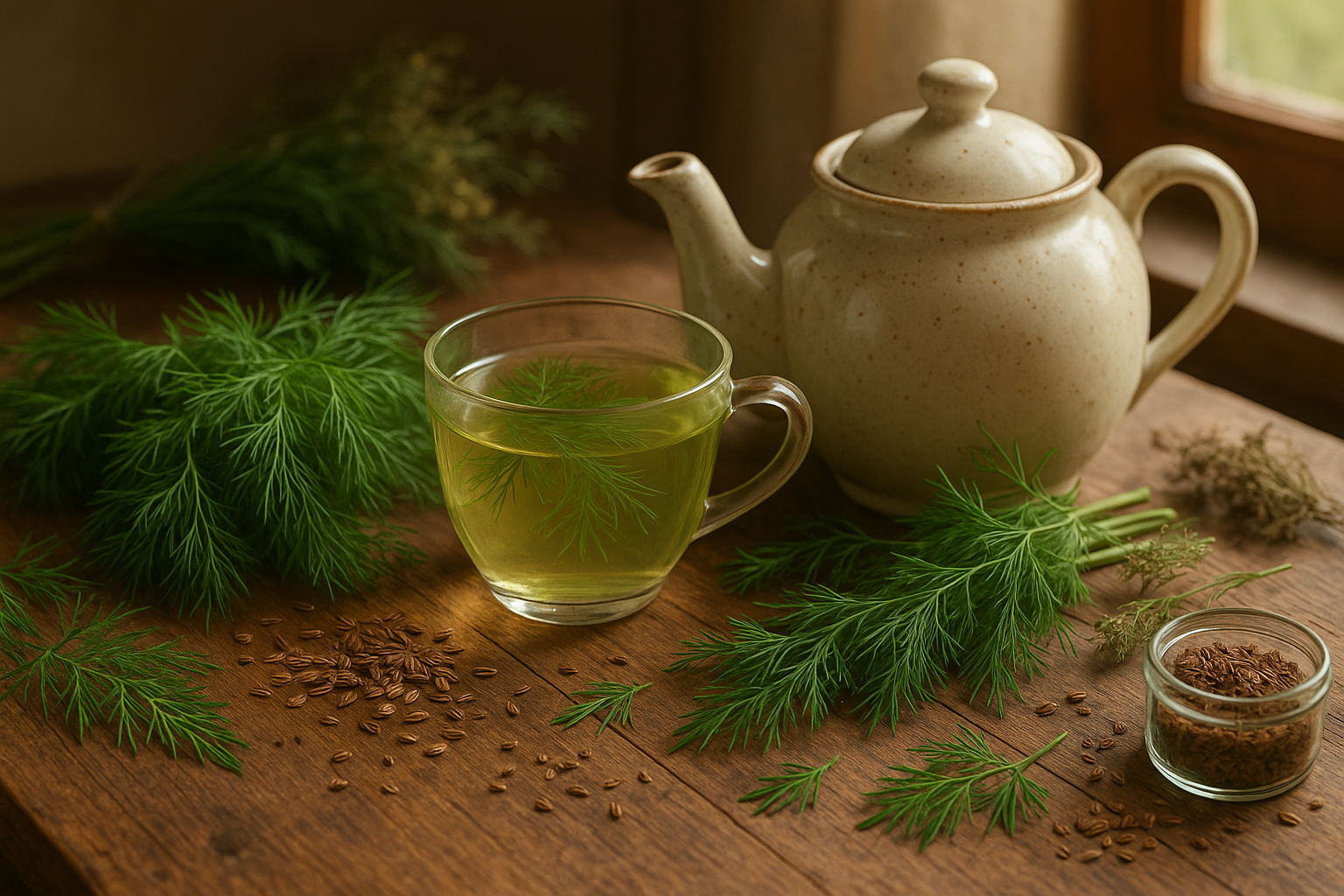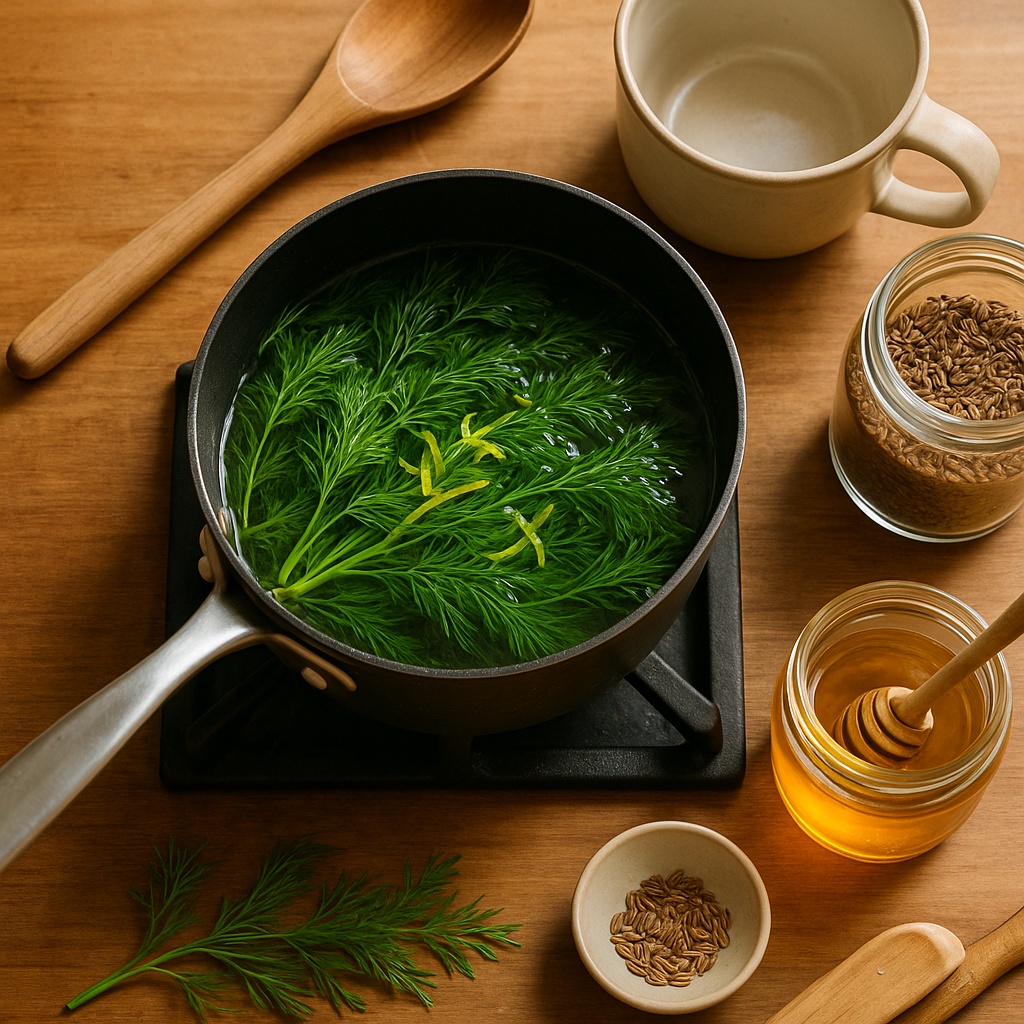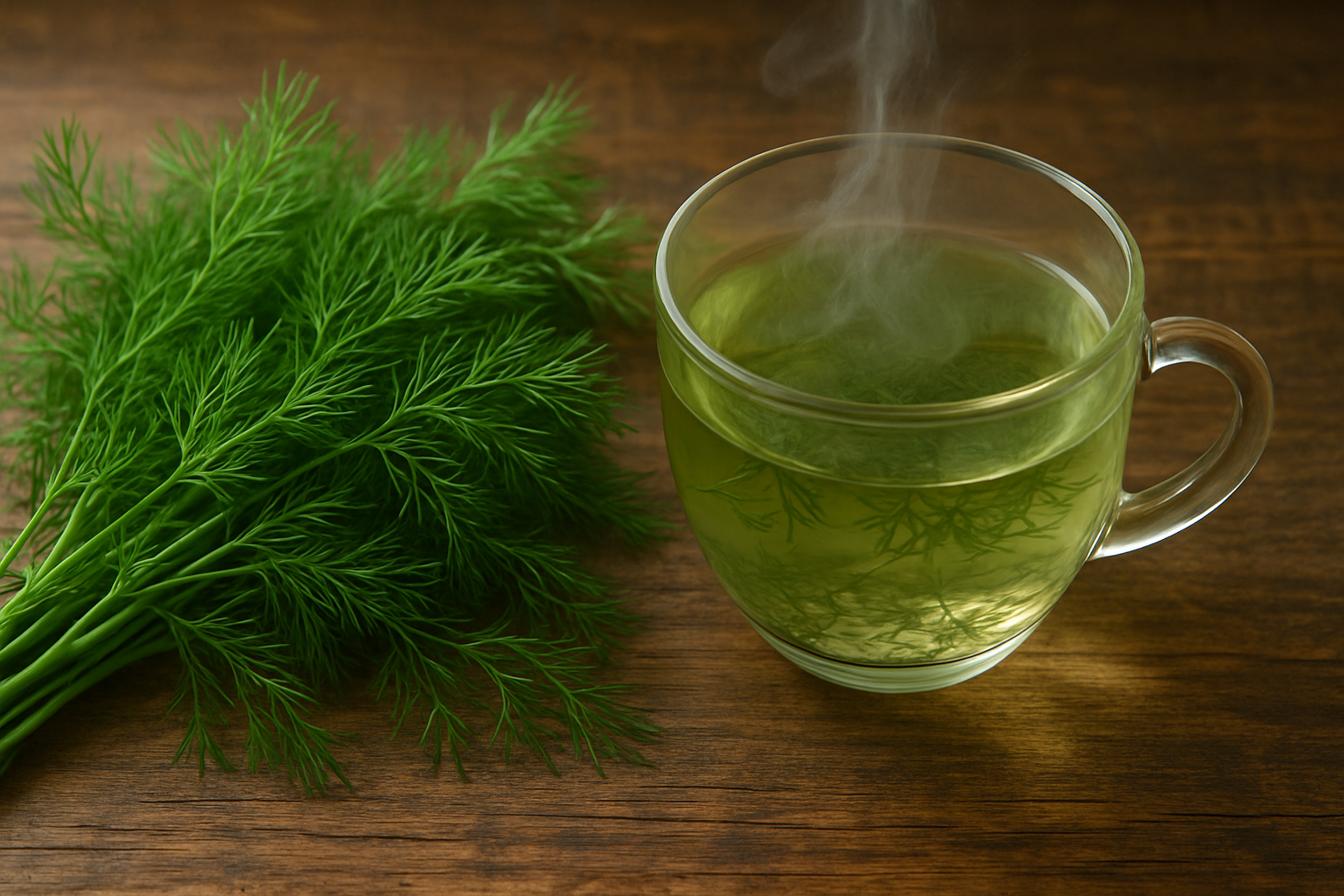Introduction to Dill Tea

When exploring natural remedies, more people are turning to herbs like dill—and it’s easy to see why. Dill tea benefits have been praised for centuries. Known for its delicate, feathery leaves and distinctive, slightly sweet flavor, dill is a staple in kitchens worldwide and a time-honored remedy in many traditional healing practices. Dill tea is simply a warm infusion made by steeping the dried or fresh leaves (and sometimes seeds) of the dill plant in hot water, creating a soothing drink that’s as comforting as it is flavorful.
The story of dill and its use as a tea stretches back to ancient times. In ancient Egypt, dill was valued not only as a flavorful herb but also as a medicinal plant believed to aid digestion and soothe the stomach. Across Europe and the Middle East, dill tea found its place in folk medicine cabinets, used to calm colicky babies, ease bloating, and even freshen breath. Russian and Scandinavian cultures embraced dill tea for its gentle calming effect and ability to warm the body during long, cold winters.
Fast forward to today, and dill tea is making a comeback in the world of modern wellness. People are rediscovering dill tea benefits—like its ability to support digestion, promote relaxation, and provide a natural dose of antioxidants. It’s easy to make at home, requiring just a handful of fresh or dried dill and hot water. Whether you’re looking for a soothing evening beverage or a simple way to enhance your health routine, dill tea deserves a spot in your cup.
Nutritional Profile of Dill
Dill packs a surprising punch when it comes to nutrition and healthful compounds. Fresh dill leaves are rich sources of vitamin C, an important antioxidant that supports immune health, and vitamin A, which promotes good vision and skin. Minerals like calcium, iron, and manganese are present in smaller amounts, helping with bone health and metabolic functions.
Dill’s signature aroma comes from essential oils such as carvone, limonene, and anethofuran, which not only add flavor but also have antimicrobial and anti-inflammatory properties, making dill more than just a culinary herb.
Fresh dill delivers the most vitamins, especially vitamin C, as these can degrade when dried. Dried dill, while convenient for longer storage, loses some vitamin content but retains minerals and a concentrated dose of those potent essential oils.
Dill seeds—often steeped for tea—contain higher amounts of certain oils like carvone and anethofuran, giving them more pronounced digestive benefits; dill seed tea has been used traditionally to soothe bloating and stomach discomfort.
For everyday use, sprinkling fresh dill over salads preserves its bright nutrients, while dried dill works well for seasoning hot dishes where the subtle aroma suffices. Dill seeds, meanwhile, are best for infusions or spice blends when you want to harness their digestive and calming properties.
Whatever form you choose, dill can bring both flavor and a subtle health boost to your kitchen.
Top Health Benefits of Dill Tea
Dill tea packs a powerful punch when it comes to supporting overall wellness, thanks to its rich supply of anti-inflammatory and antioxidant compounds. These naturally occurring phytochemicals help your body fend off cellular damage caused by everyday stressors—think pollution, processed foods, and even intense workouts.
By calming inflammation, dill tea may ease discomfort from conditions like arthritis and promote faster recovery after physical activity. Its antioxidants, such as flavonoids, support your body’s natural defense system and can contribute to healthier skin, improved immunity, and even a better mood.
Emerging research suggests that regular consumption of dill tea may help reduce cholesterol levels, benefiting cardiovascular health by lowering “bad” LDL cholesterol while supporting “good” HDL cholesterol. Keeping cholesterol in check is key to a healthy heart, potentially reducing the risk of heart disease and stroke.
If you struggle with blood sugar spikes, dill tea may offer gentle support for glucose regulation. Some small studies show promising improvements for people managing diabetes, especially when paired with a balanced diet and healthy lifestyle.
Women may find additional benefits, as dill has a long history of relieving menstrual discomfort and easing mild anxiety during labor, making it a comforting herbal ally through various phases of womanhood.
Traditionally, dill tea is sipped after meals to soothe digestive woes like bloating and cramps, and its calming aroma is known to help reduce tension and settle nerves—a simple way to unwind at the end of a stressful day.
Given its gentle approach and centuries of use, dill tea offers an easy, natural boost to your daily wellbeing, especially when incorporated as part of a holistic, healthy living routine.
Potential Risks and Precautions
Before starting any new supplement or medication, it’s important to be aware of possible risks and take the right precautions. Some products may cause side effects like nausea, headaches, or digestive issues. In rare cases, severe allergic reactions such as rashes, swelling, or difficulty breathing can occur—if this happens, seek immediate medical attention.
Pregnant or breastfeeding women should consult a healthcare provider before using any supplements, as certain ingredients can pass to the baby or affect milk production, potentially leading to complications. People with chronic health conditions like diabetes, heart disease, liver problems, or autoimmune disorders need to be especially cautious, since new substances might worsen symptoms or interact negatively with their current medications.
Drug interactions are a common but often overlooked risk. For example, herbal supplements like St. John’s Wort can reduce the effectiveness of birth control pills or antidepressants, while some pain relievers can strain the liver or kidneys if combined with other medications.
It’s vital to stick to recommended dosage limits—usually found on the product label or advised by a doctor—to avoid accidental overdose, which could cause toxicity or organ damage. A good rule of thumb is to introduce only one new supplement at a time and monitor your body’s response. Always keep your healthcare provider informed about everything you’re taking, including over-the-counter products and vitamins. This approach helps minimize unwanted surprises and keeps your health—and peace of mind—intact.
How to Make Dill Tea at Home

Making dill tea at home is simple and rewarding, whether you’re using fresh dill leaves, dried dill, or dill seeds. Start by boiling 2 cups of water in a small pot.
For fresh dill, wash and roughly chop 2–3 tablespoons of leaves. If you’re using dried dill or seeds, 1 tablespoon is enough. Add your dill to the boiling water, reduce the heat, and let it simmer for about 5–7 minutes.
For extra flavor and wellness, toss in a slice of fresh ginger or a thin strip of lemon zest while simmering. Once your tea is aromatic and slightly greenish, strain it into a cup.
Stir in honey to taste for a touch of natural sweetness, or squeeze in a wedge of lemon to brighten the flavor and boost vitamin C. You can even add a pinch of peppermint or chamomile for more soothing qualities.
For best results, cover your tea as it steeps to trap the beneficial oils that give dill its distinctive aroma and digestive benefits. Enjoy your cup warm for comfort, or chill it over ice for a refreshing summer drink.
Freshly brewed dill tea is known for aiding digestion and calming the stomach—perfect after a heavy meal or when you need a moment of zen. Experiment with ingredient amounts until you find your perfect brew, and don’t hesitate to mix in other herbs like fennel or parsley for even more depth and health perks.
Tips for Enjoying and Incorporating Dill Tea
Incorporating dill tea into your daily routine is easier than you might think and can be a soothing, enjoyable ritual. Many people like to start their morning with a warm cup to ease digestion or wind down in the evening after a meal, as dill’s gentle aroma pairs well with relaxation.
If you’re cooking dinner, try sipping dill tea alongside light meals like fish, salads, or roasted vegetables—the herbal notes complement fresh flavors beautifully. For most adults, one to two cups of dill tea per day is a reasonable amount, but even having a few cups a week can provide benefits without overwhelming your palate.
To make dill tea part of your self-care, steep fresh or dried dill in hot water for about 5–7 minutes; adding a slice of lemon or a bit of honey can create a refreshing twist. If you prefer preparing ahead, brew a larger batch and keep it in the fridge in a sealed jar; dill tea will stay fresh for up to three days when refrigerated.
Store dried dill in a tightly sealed jar in a cool, dark place, where it will keep its potency for up to six months, while fresh dill should be kept in the refrigerator and used within a week.
Whether sipped warm or served iced on a sunny afternoon, dill tea makes a versatile addition to your wellness routine—just remember to enjoy it in moderation and listen to your body’s response.
Frequently Asked Questions About Dill Tea
Dill tea is gaining popularity for its mellow, grassy flavor and gentle health benefits, leaving many curious about its uses and safety. One common question is whether dill tea can help with sleep. While it’s not as strong as chamomile, dill’s calming properties may help relax the digestive system and ease mild tension before bed.
For parents, dill tea is generally safe for school-aged children in small amounts, especially for soothing upset stomachs. However, pregnant women should consult their doctor first, as dill can have mild effects on hormones.
Preparation Tips
You can use either fresh or dried dill when making dill tea. Fresh dill offers a brighter, almost citrusy note, while dried dill is more convenient and has a slightly earthier flavor. Simply steep a teaspoon or a small handful in hot water for 5–10 minutes.
Taste and Flavor
Some people find the taste slightly grassy and reminiscent of licorice. Adding honey or lemon can create a more balanced and enjoyable flavor.
Herbal Substitutes and Brewing Advice
- If you run out of dill, fennel or anise make good herbal substitutes, especially for digestive support.
- To minimize bitterness, avoid over-steeping and use water that is just off the boil.
Whether you’re looking for a gentle digestive aid or an herbal nightcap, dill tea is easy to adapt and enjoy, making it a cozy and health-conscious choice for many households.
Conclusion
Dill tea offers a range of inviting benefits, from soothing occasional digestive discomfort to potentially easing menstrual cramps and supporting a calm state of mind. Thanks to its natural compounds, it’s a gentle, caffeine-free option that fits well into a wellness routine, especially if you’re seeking new, herbal ways to unwind.
However, dill tea isn’t for everyone—pregnant individuals, people with allergies to similar herbs, or those taking certain medications should be cautious, as dill can sometimes cause mild reactions or interact with prescriptions. Starting with a small cup lets you gauge how your body responds.
Remember, even natural remedies work best as part of a balanced lifestyle that includes varied nutrition, regular movement, and good sleep. Trying a fresh, homemade dill tea is a simple way to explore its effects, whether you’re seeking better digestion or just a relaxing tea break.
If you have chronic health issues or take medication, it’s wise to chat with your healthcare provider before adding dill tea to your daily lineup. This small step ensures you get the benefits safely and confidently, so you can enjoy all that dill tea has to offer with peace of mind.
